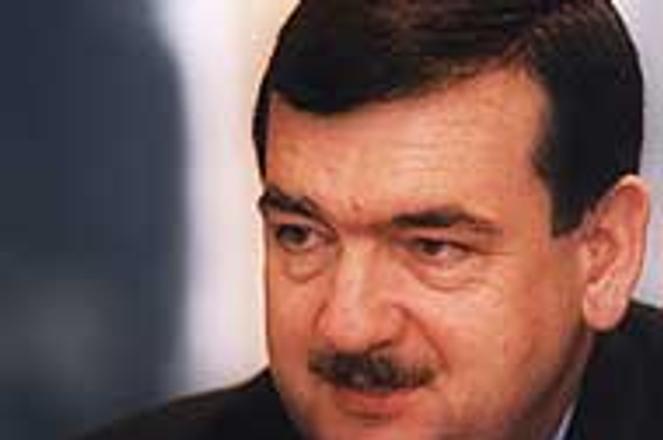Economy Minister Ľudovít Černák blames the press.photo: TASR
For the fourth time in a year, opposition MP's from the Movement for a Democratic Slovakia (HZDS) last week called for a vote of non-confidence against a minister of the current government. For the fourth time, they failed.
The latest motion was brought against Economy Minister Ľudovít Černák, who is accused by opposition leaders and critics of clientelism, if not outright corruption, in the handling of a number of important economic deals made under his watch.
The list of bungled operations includes the sale of gas storage firm Nafta Gbely, a non-transparent tender for a mediator to settle the Russian debt to Slovakia, and the loss of the state's majority in the Košice-based financial house Priemyselná Banka.
Though Černák retained enough support from the governing coalition to keep his post in the September 28 non-confidence vote, the mixed results of the ballot and subsequent comments made by government members to the press indicate that even Černák's political allies are becoming uncomfortable supporting his performance.
In the days preceding the vote, analysts and some members of the government suggested that Černák either step down or that Prime Minister Mikuláš Dzurinda rise to the occasion and take decisive action before any more damage was caused to the ruling coalition.
"Minister Černák is lowering the credibility of Dzurinda's cabinet," said political analyst Luboš Kubín from the Slovak Academy of Sciences.
He estimated that as time passed, voices within the cabinet calling for Černák's dismissal would only strengthen. "Prime Minister Dzurinda should now behave like the captain of his team and make a clear statement on this issue. If he continues to hide behind political parties and the coalition council [a senior government body], it could turn public opinion against him," Kubín said.
The non-confidence motion was proposed on September 21 by 39 HZDS members of parliament, who signed a statement accusing Černák of not following the policy statements of the Slovak government.
"His actions have a damaging impact on the Slovak economy," HZDS MP Jozef Brhel announced on Tuesday to the Parliamentary Committee for Business, Privatisation and Economy. "He is considered a clientelist by the public, businessmen, as well as by the media. Therefore we propose his recall."
Of the 98 MP's present at the September 28 vote, 36 voted for Černák's dismissal, 27 against and 35 abstained. A simple majority of the MP's present would have been sufficient for the motion to carry.
Černák defended himself the day before the vote on Sito, a TV Markíza talk show, by saying he has the political support of the coalition council and doesn't feel any responsibility for the economic affairs for which he is blamed. He faulted the media for printing rumours and allegations.
"I'm not going to give up just because of rumours. I know I'm doing good job," Černák said.
But Martin M. Šimečka, editor-in-chief of the prominent Sme daily paper, said he would continue to encourage his reporters to watch possible scandals closely. "The reason we care so much about these scandals is because we consider corruption a very serious problem of Slovak society," he said.
While Černák proclaimed his innocence, few government ministers were willing to add their voices to his, although they were not prepared to go as far as to support the oppostion's non-confidence motion.
According to the SITA press agency, for example, representatives of the government Hungarian Coalition Party (SMK) announced on September 25 and 26 they thought Černák should offer to step down.
Peter Osuský, the vice-chairman of the Democratic Party, told TV Markíza on Monday that Černák might want to leave the cabinet, as "his name has become too discredited."
Even Černák's mother party, the Democratic Union, would not express its clear support. DU leader Lubomír Harach told SITA on Saturday that his party would not make a statement on the motion until after the resolution of the Priemyselná Banka affair investigation (see story, page 2).
Former Telecom Minister and SDK deputy Gabriel Palacka, who himself stepped down from his post after being linked to scandal, called the affair "Černák's problem."
Three other government ministers - Interior Minister Ladislav Pittner, Foreign Affairs Minister Eduard Kukan and Vice Prime Minister for Minorities Pál Csaky - have already faced failed non-confidence motions in parliament.
The HZDS on Monday announced they are planning another non -confidence motion against Culture Minister Milan Kňažko.
Because of the strict division between the government and the opposition in Parliament, the passage of any non-confidence vote proposed by the HZDS is unlikely.
However, HZDS vice-chairman and former Speaker of Parliament Ivan Gašparovič said on Tuesday that the HZDS is going to continue to call such votes.
"Such actions are one tool of the opposition to show disagreement with the government's policy," Gašparovič said.


